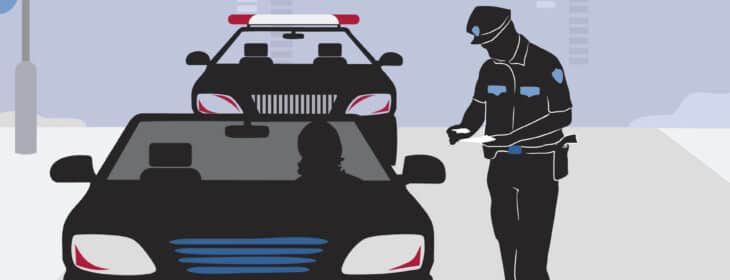
The short answer is yes—you should cooperate with the police, even if you believe that what they are doing is legally wrong. Cooperating with the police can be the best way to protect yourself physically and legally, and to preserve a civil rights claim.
Let’s say you are approached by a police officer and he starts questioning you. You haven’t done anything wrong and you’re not sure why he has approached you. He then says you are under arrest. What do you do now?
Easy answer: Cooperate and comply with police direction.
Police violence and police brutality are in the news more than ever before. There are plenty of opinions about the police: how they do their jobs, how broad their powers should be, and even if they should exist at all.
These are vital discussions and debates, and they get at one of the most significant aspects of being in a large society: the authority and conduct of armed government actors when dealing with the citizens they are sworn to protect.
But none of those discussions will help you if you get pulled over or approached by an officer this afternoon.
Failing to cooperate with the police can lead to some terrible outcomes. Not only can you get yourself badly hurt, you risk your legal defense and a possible civil rights claim down the road. You will have legal recourse if a police officer uses excessive force, but failing to cooperate with police officers will make your case much more difficult, if not impossible, to win.
Bottom line: Comply first and complain later!

The first and most important recommendation is to remain calm, cooperative, and compliant when dealing with the police. Arguing, resisting, and fighting will get you into more trouble, endanger your physical safety, and increase your legal jeopardy.
There is no such thing as a moral victory on the street. This is not about right and wrong. This is about you being smart and putting yourself in the best position to protect your physical safety and your legal rights. You do this by keeping your cool, not arguing, and remaining calm and respectful on the street, where the police have the advantage, as well as all sorts of equipment designed to painfully force you into submission.
This may not be easy, especially when you’re dealing with an overzealous or abusive police officer. But regardless of whether you’re dealing with a disciplined professional or an abusive bully, these recommendations will give you the best chance to minimize any physical harm and maintain your legal rights in criminal and civil court.
When interacting with the police in public:
| Do: | Don’t: |
| -Comply with the officer’s orders. -Keep your hands out where they can be seen -Act calmly -Move slowly and predictably -Ask the officer if you can make a specific move, like reaching into your pocket -Let the officer know if you have any weapons -Allow yourself to be handcuffed and detained or arrested | -Argue -Resist or fight the officer -Threaten the officer -Make any quick moves |
The smart play is always to keep your composure. Don’t argue, and don’t resist, no matter how difficult that may be if you know you’ve done nothing wrong. In short, cooperate with the police. Down the road, when you get a chance to speak with an attorney, you can prepare your arguments.
Let’s review some best practices when interacting and cooperating with the police:
If an officer feels threatened, he is more likely to escalate the situation and use force against you. Nothing is more threatening to an officer than a suspect’s hands, especially of the officer can’t see them. So make sure your hands are visible at all times.
Move slowly and predictably. If you’re going to remove something from a pocket or a glove compartment, make sure you tell the officer what you’re doing. In fact, make sure the officer approves it.
Remember, you’re dealing with someone who has a gun and the legal right to use it. You don’t know the officer, and he doesn’t know you. You may be dealing with a nervous rookie, a seasoned veteran, a disciplined professional or an overzealous bully. For your purposes, it doesn’t matter. The calmer you are, the more cooperative you are, the better off you’ll be. Period.
Most Chicago police officers, and many other Illinois police officers, wear bodycameras. Even more officers have cameras installed in their squad cars.
The video and audio footage from these cameras are generally high-quality, and they capture pretty much everything that happens during police-citizen encounters. Act like the judge and jury will see and hear everything that goes on between you and the officer, because they likely will.
Use this to your advantage: the calmer and more cooperative you are, the better you look, and the stronger your case will be, regardless of whether you’re a defendant in a criminal case or a plaintiff in a civil lawsuit.
Remember, cooperate first, complain later.
Cooperating with the police will not undermine your ability to pursue a legitimate claim against them later on. On the contrary, it will enhance and support your legal position. It may be tough to cooperate with police officers who you think are wrongfully arresting you, or who are mistreating you. But it is one of the best things you can do to maintain your physical safety and your legal rights.
Remember: you have rights, but so does the officer. When you fail to cooperate, you provide the officer with 1) probable cause to arrest you, and 2) the right to use force against you. While it is true that an officer has no right to use excessive force against you even if you resist, failure to cooperate with the police will make your life more painful, and will make it that much more difficult to prove an officer used excessive force.
If you believe you or someone you know has been the victim of false arrest, police brutality, excessive force, or any other legal or constitutional violation, contact Chicago civil rights attorney Jordan Marsh for a free consultation at (224) 220-9000, or by email at jordan@jmarshlaw.com.
The information provided on this website does not, and is not intended to,
constitute legal advice; instead, all information, content, and materials available on this site are for general informational purposes only. Use of and access to this website or any of the links contained within the site do not create an attorney-client relationship between you and our office.